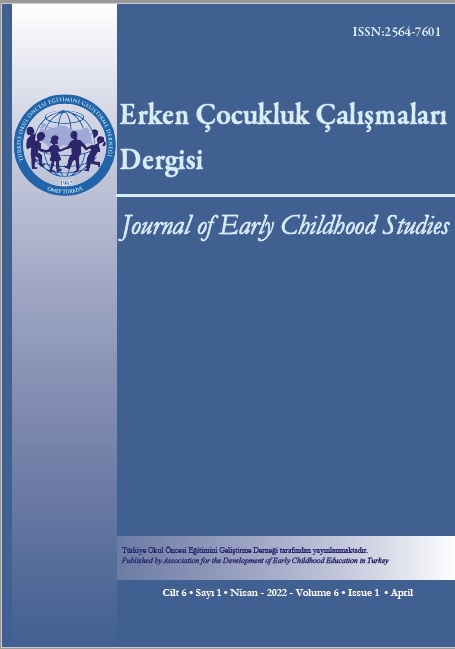Johann Heinrich Pestalozzi’yi konu alan ve Web of Science’ta taranan makaleler üzerine bir içerik analizi
Anahtar Kelimeler:
Pestalozzi, İçerik Analizi, Doküman Analizi, Web of ScienceÖzet
İsviçreli eğitimci Johann Heinrich Pestalozzi (1746-1827) tarihsel süreçte eğitim bilimine, yaklaşımlarına, felsefesine çeşitli katkılarda bulunmuştur. Bu katkılar derinlemesine incelendiğinde görülüyor ki Pestalozzi’nin yaşamı boyunca deneyimlediği kültürel, siyasi, ekonomik, toplumsal olaylar ve kişisel yaşam öyküsü onun eğitime dair yaklaşımını şekillendirmesini sağlamıştır. Bu araştırmanın amacı Pestalozzi’yi içeren makalelerin yöntemi, konu alanı, atıf bilgisi gibi çeşitli konularda ve araştırmaların kavramsal temaları hakkında betimsel bir içerik analizi sağlamaktır. Araştırma yaklaşımı betimsel içerik analizi olarak belirlenmiştir. Web of Science’ta taranan ve konu alanında Pestalozzi’yi içeren 25 makale doküman analizi tekniği ile analiz edilmiştir. Analiz edilen makaleler bulgularda on ayrı başlık altında değerlendirilmiştir. İncelenen makalelerin sıklıkla derleme makale türünde yayımlandığı, “Eğitim ve Eğitim Araştırmaları; Sosyal Bilimler Tarihi” kategorisinde yer aldığı ve konu alanlarının müzik, sanat eğitimi, eğitimde reformlar ve eğitimde sosyal duygusal unsurlar olduğu görülmüştür. Bulgulara ilişkin detaylı değerlendirmeler ve tartışmalar yapılmıştır.
Referanslar
Albisetti, J. C. (2012). The Empress Frederick and female education in the late nineteenth century: Germany, England and Italy. Paedagogica Historica, 48(3), 345-355.
Aslanian, T. K. (2015). Getting behind discourses of love, care and maternalism in early childhood education. Contemporary Issues in Early Childhood, 16(2), 153-165.
Bognar, L., & Dubovicki, S. (2012). Emotions in the teaching process. Croatian Journal of Education: Hrvatski časopis za odgoj i obrazovanje, 14(1), 135-153.
Boichenko, M., Nykyforov, A., & Hulei, O. (2020). Genesis of the idea of using folk arts and crafts elements in teaching and upbringing in classical Ukrainian and Western European pedagogical thought. Journal of History Culture and Art Research, 9(2), 123-132.
Bowers, F. B., & Gehring, T. (2004). Johann Heinrich Pestalozzi: 18th century Swiss educator and correctional reformer. Journal of Correctional Education, 55(4), 306-319.
Brunelli, M. (2013). From nature guiding to nature interpretation in the United States (1872-1920). The origins of the professional practice of heritage interpretation: Between protection and education. History of Education & Children's Literature, 8(1), 399-429.
Campos, R. H. D., & Borges, A. A. P. (2014). De Genève à Belo Horizonte, une histoire croisée: circulation, réception et réinterprétation d’un modèle Européen des classes spéciales au Brésil des années 1930. Paedagogica Historica, 50(1-2), 195-212.
Cooper, J. A. P. (2016). Routledge encyclopaedia of educational thinkers. New York: Routledge.
Dinçer, S. (2018). Content analysis in scientific research: Meta-analysis, meta-synthesis, and descriptive content analysis. Bartın University Journal of Faculty of Education, 7(1), 176-190.
Elliott, P., & Daniels, S. (2006). Pestalozzi, Fellenberg and British nineteenth-century geographical education. Journal of Historical Geography, 32(4), 752-774.
Follari, L. (2015). Foundations and best practices in early childhood education: History, theories, and approaches to learning. New Jersey: Pearson Education.
Füssl, K. H. (2006). Pestalozzi in Dewey’s realm? Bauhaus master Josef Albers among the German‐speaking Emigrés’ Colony at Black Mountain College (1933–1949). Paedagogica historica, 42(1-2), 77-92.
Giorgetti, F. (2014). New school of Mustafa Satı Bey in Istanbul (1915). Paedagogica Historica, 50(1-2), 42-58.
Goulah, J. (2020). Human education: Daisaku Ikeda’s philosophy and practice of Ningen Kyōiku. Schools, 17(1), 153-170.
Horlacher, R. (2011). Schooling as a means of popular education: Pestalozzi's method as a popular education experiment. Paedagogica Historica, 47(1-2), 65-75.
Horlacher, R. (2013). Do educational models impose standardization? Reading Pestalozzi historically. İçinde T. Popkewitz, (Ed.), Rethinking the history of education: Transnational perspectives on its questions, methods, and knowledge (ss. 135-156). New York: Palgrave Macmillan.
Howe, S. W. (2000). Swiss-German music books in the Mason-McConathy Collection: Accounts from Europe to the United States. Journal of Research in Music Education, 48(1), 26-38.
Jordan, A. (2015). ‘Be not a copy if thou canst be an original’: German philosophy, republican pedagogy, benthamism and saint-simonism in the political thought of Gioacchino di Prati. History of European Ideas, 41(2), 221-240.
Koops, W. (2012). Jean Jacques Rousseau, modern developmental psychology, and education. European Journal of Developmental Psychology, 9(1), 46-56.
Kuhlemann, G. & Brühlmeier, A. (2002). Johann Heinrich Pestalozzi. Schneider-Verlag.
Moore, K. (2019). James Bonwick: Australian school inspector and Fellenberg disciple. Paedagogica Historica, 55(2), 183-206.
Musser, J. (2019). Carl Czerny's mechanical reproductions. Journal of the American Musicological Society, 72(2), 363-429.
Nieto, C. Z. (2018). The concept of sentimental boyhood: The emotional education of boys in Mexico during the early Porfiriato, 1876–1884. Boyhood Studies, 11(1), 27-46.
Noel, R. (2018). “No wonder they are sick, and die of study”: European fears for the scholarly body and health in New England schools before Horace Mann. Paedagogica Historica, 54(1-2), 134-153.
Orlandi, O., & Junges, I. (2015). The Atualidades Project-a generator of improvement in the teaching-learning process: Report of a teaching method carried out in a higher education institution. Revista Brasileira de Gestão de Negócios, 17(56), 1090-1104.
Page, M. J., McKenzie, J. E., Bossuyt, P. M., Boutron, I., Hoffmann, T. C., Mulrow, C. D., ... & Moher, D. (2021). The PRISMA 2020 statement: an updated guideline for reporting systematic reviews. Bmj, 372.
Pestalozzi, J. H. (2018). Çocuğunu nasıl eğitirsin. (B. Erdoğdu, Çev.). İstanbul: Roza.
Petsche, H. J. (2014). The ‘chemistry of space’: The sources of Hermann Grassmann's scientific achievements. Annals of Science, 71(4), 522-576.
Reese, W. J. (2013). In search of American progressives and teachers. History of Education, 42(3), 320-334.
Rose-de Viejo, I. (2010). Godoy's gift of his portrait to Pestalozzi in 1808. Burlington Magazine, 152(1291), 671-674.
Scheurer, E. (2009). "[S]o of course there was speaking and composition-": Dickinson's early schooling as a writer. The Emily Dickinson Journal, 18(1), 1-21.
Siegesmund, R. (2013). Art education and a democratic citizenry. International Journal of Art & Design Education, 32(3), 300-308.
Soysal, Y., Radmard, S., Kutluca, A. Y., Ertepınar, H., Ortaç, F. R., Akdemir, Z. G., & Türk, Z., (2019). Türkiye yükseköğretimindeki kavramsal, olgusal, tematik ve yöntembilimsel tercihler. Yükseköğretim ve Bilim Dergisi/Journal of Higher Education and Science, 9(1), 17-36.
Tröhler, D. (2013). Pestalozzi and the educationalization of the world. New York: Palgrave Macmillan.
Yıldırım, A., & Şimşek, H. (2016). Sosyal bilimlerde nitel araştırma yöntemleri. Ankara: Seçkin.
Yayınlanmış
Nasıl Atıf Yapılır
Sayı
Bölüm
Telif Hakkı (c) 2022 Erken Çocukluk Çalışmaları Dergisi

Bu çalışma Creative Commons Attribution-NonCommercial 4.0 International License ile lisanslanmıştır.






